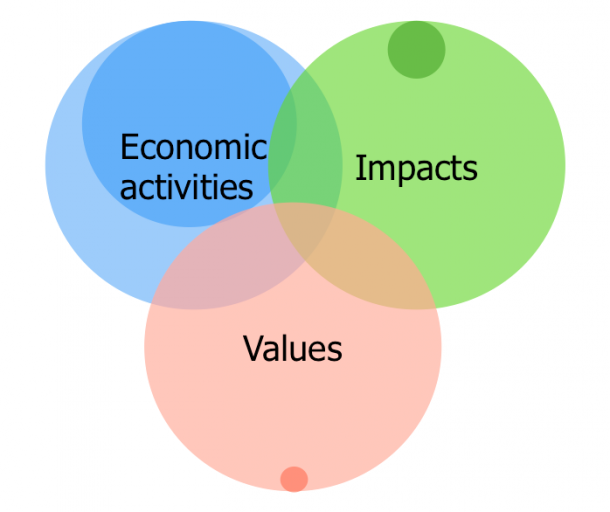The next step – open LCA data
May 26, 2017 by Bo Weidema
In a previous blog-post, I used this picture to illustrate the gap between the available information (the large circles) and how much of this information is typically used by current LCA practice (the smaller circles within each large one):

At 2.-0 LCA consultants we have been working hard to ensure that we use the most recent, transparent, reviewed, and spatially detailed data, modelling economic activities with data from globally complete and physically balanced IO-databases, including rebound effects based on marginal consumer behaviour, modelling impacts with a social footprinting method that covers the total global annual loss of natural habitats, human health, and social wellbeing, and by modelling values with data from welfare economics on market prices and representative population surveys, including equity-weighting and science-based discounting.
But staying on top of the current exponential growth of data requires the use of new social and digital technologies: To make efficient use of the options offered by what Klaus Schwab has called the fourth industrial revolution we need to cooperate as a community and use the automated tools of artificial intelligence to create and use linked open data. This is the reason that 2.-0 LCA consultants have decided to sponsor the work of BONSAI – The Big Open Network of Sustainability Assessment Information.
We see how other scientific communities, from astronomy to deep earth seismology, struggle with the same problems of managing the unprecedented amount of data needed to provide increasingly precise understanding and predictions within their fields. We see how these scientific communities have embraced open data as fundamental for the advancement of their research, and have started to cooperate across scientific disciplines.
Last month, I attended – together with BONSAI executive Michele De Rosa – the 9th plenary meeting of the Research Data Alliance (RDA). RDA is a community-driven organization with more than 5000 members from 123 countries, building the social and technical infrastructure to enable open sharing of big data. It was a vibrant, overwhelming experience that confirmed to us that the time for open science is now mature. With an interdisciplinary perspective, the many Interest Groups (IG) and Working Groups (WG) in RDA address common problems such as how to harmonize metadata structure, how to address data classification issues, how to credit scientists for sharing data, how to address the legal issues concerning the sharing and harvesting of data. If you are curious to know more, a full report from our activities at the RDA plenary is now available.
The scientific domains of LCA, industrial ecology and IO-economics, were, to our knowledge, represented at RDA for the first time by us, which made us feel more like representatives of a laggard community than pioneers.
We believe that the LCA community needs to come up to speed and engage more intimately with the data science community, and we therefore intend to maintain a constant presence in RDA. Plenaries are held twice a year and the next plenary will be in September in Montreal. We are working on a session proposal to create an Interest Group within RDA to target the needs of our scientific domain and invite the LCA community to join us with contributions and suggestions.